People Psychology: How To Influence Other's Behaviour For The Better

We interact with other people all day, every day.
We also behave a certain way and make decisions subconsciously all the time.
But have you ever asked yourself why sometimes, trying to influence other people doesn't really work but instead makes them more stubborn?
Let's find out how to actually influence people for the better - and learn about our own actions and how we are being influenced as well!
Tali Sharot is an Isreali who currently works as associate professor of cognitive neuroscience at University College London.
She's a neuroscientist and Author, and in her latest book "The Influential Mind" she writes about some interesting insights about human psychology which I'd like to share with you.
Everybody has their reasons
If we're given a choice but we know how other people have decided - we naturally tend to imitate their choice.
Not because we don't trust our own opinion, but it's simply a natural instinct to assume others might have more information that we do, and that they'll have their reasons for their decision.
One quite interesting example is that 10% of kidney donations go unused within the US - because after one patient has rejected it, others are more likely to refuse as well, even though the kidney might be perfectly fine.
What we tend to forget easily is that everyone makes decision based on different factors, and someone else's choice might be wrong for ourselves.
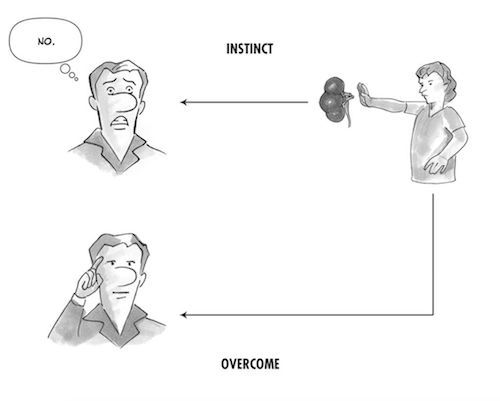
Common Ground
When we argue with someone who has a different opinion on a specific topic, it's easy to try to prove that we're right and they're wrong.
But maybe you've already noticed that this tactic doesn't always work. If your argument isn't good enough, or if someone is either stubborn or passionately defends his opinion, you will have a hard time convincing him of the contrary just by stating some facts. The other party will either try to come up with counterarguments or turn away completely.
Instead, the best solution would be to find some common ground.
If parents don't want to vaccinate their children, providing them with data that shows no negative side effects of vaccines will probably not change their mind.
But if you tell them that vaccines can protect their children effectively from deadly diseases, they might listen - because this argument doesn't contradict with their prior beliefs and also coincides with the common ground of keeping the children healthy and safe.
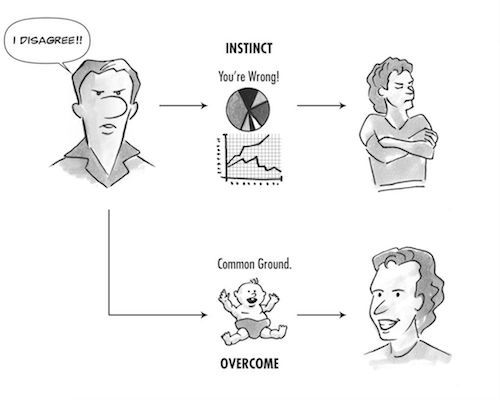.jpeg)
Equality Bias
Let's say you're facing a tough decision. 5 people tell you "yes", and one person tells you "no".
Our immediate instinct would be to go with the majority vote and say "yes".
But we have to keep in mind that this is nothing more than an equality bias.
We have to stop giving everyone's opinion equal weight. Instead, we should figure out who the expert on this topic is, and give their opinion a larger weight.
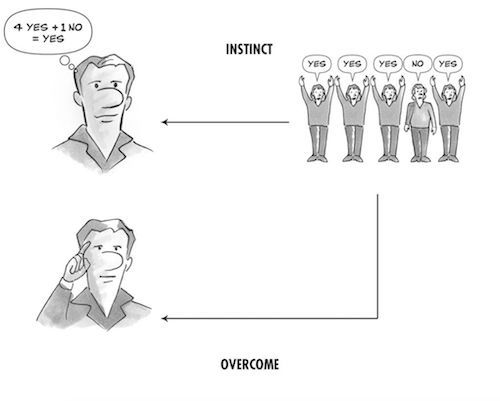.jpeg)
Motivate, don't force
When we try to change other people's actions, the first thing that comes to mind is giving orders. But the problem with that is that we tend to suffocate people's independence this way. They feel limited and demotivated and probably won't pursue what we'd like them to do.
Instead, we should try to push their sense of control and motivate them so that they become more productive and happy - we offer a choice instead of forcing an order.
An example would be that people who were given the opportunity to advise how their taxes should be designated increased the chances that they'd actually pay them in full.
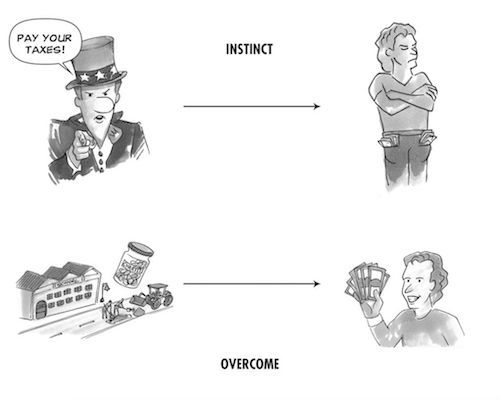.jpeg)
Emotions and their Influence
Emotions can be influential too - although we might not even notice it.
Too often, we feel like our emotions are private, not realizing that people around us can interpret them easily (even if it's unconsciously). And actually, their behaviour gets affected by it as well - so you should be aware of your feelings and their effect on others.
When a parent is constantly stressed / angry for example, the child subconsciously becomes less social and less trusting of other people around them.
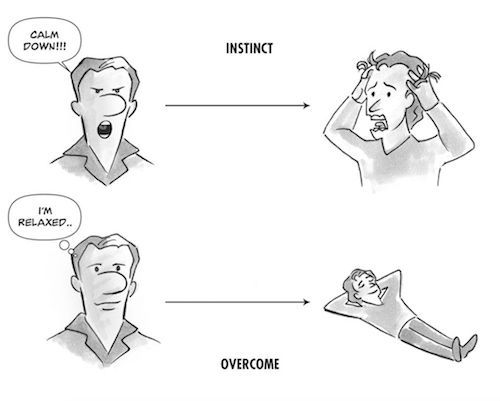.jpeg)
Combine Importance with Positivity
Important messages aren't always easy to convey with the amount of urgency that we'd like. Our natural instinct is that others will automatically want to know if we have something important to convey - but that's not always the case.
The best example for this is the safety briefing on airplanes.
The information is definitely important, but since it's tied to a dreary and depressive message of an eventual plane crash, many listeners will actively avoid it.
Instead, we should rephrase the message so that the information induces positive feelings like safety to show that the knowledge can be used for the better.
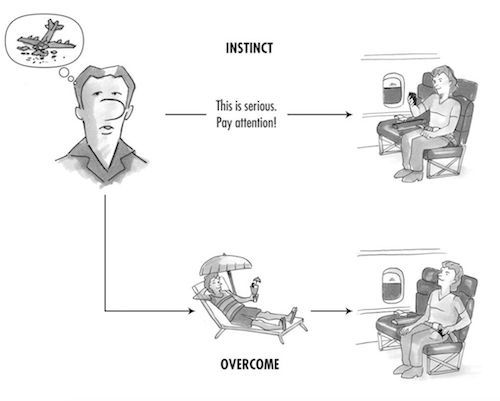.jpeg)
Replace Threats with Rewards
This ties in with the previous point. When trying to change other people's actions, we often issue warnings and convey dangers and negative feelings. As a result, fear tends to make people freeze rather than act.
Instead of threatening, we should motivate people with a positive message and immediate rewards.
They can be small or seemingly meaningless - but still, our brains react to all kinds of positive rewards.
For example: medical staff at a hospital was ordered to sanitize their hands very frequently, otherwise dangerous bacteria could spread. Although this is an important warning, it didn't have much of an effect.
Instead, there was a live-feedback electronic board installed that rewarded the user with a positive message everytime they sanitized their hands.
As a result, sanitization went up 90% among staff members.
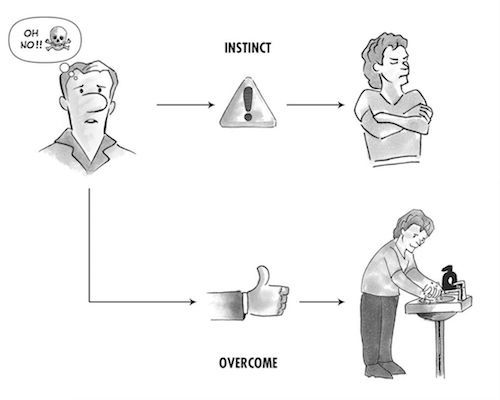.jpeg)
These are just a few examples of how human behaviour is being influenced. Do you have any other examples or tips for this topic?

© Sirwinchester
Strong advise - i can learn from you, let us catch up in Hamburg once.
very interesting
Knowing these types of behaviors is important. thanks for the info. I love these types of issues about human behavior.
This is one of the best things i've ever seen.
I get caught in the trap of trying to influence people with "facts". I like the idea of finding common ground. it's so difficult to talk to people about topics like politics and religion. When I talk about crypto it's like I am selling them something
I can totally relate - when telling people about crypto, you always sound like you're trying to convince them of something but they don't want to hear it when in reality, you already know crypto is awesome and you just want to help them.
Family is the worst .
I agree. Psychology is interesting. Like when people feel fatter while they are eating something sweet, or you feel like your car is running better when it is cleaner inside.😀 😃 😄 😁
Ever heard of nlp/hypnosis?
Amazing post on human behaviour and their way of influencing. Thank you @sirwinchester
How to handle people & their perceptions is important concept in psychology, this article helps to understand how we influence others. Excellent sharing.
upvote & resteemed & Following @sirwinchester
I hate filling out paperwork in my work van but it's part of my job. There will be no traffic, people walking around or anything while I'm filling out this said paperwork. When I'm finished with paperwork, ready to drive - you better believe there's people driving, walking and basically all up in the way so I can't get going. Not while I'm not trying to go mind you, but as soon as I'm ready to go, people happen.. Never fails..
Yeah makes sense.
Nice bro ;) :)
Thanks!